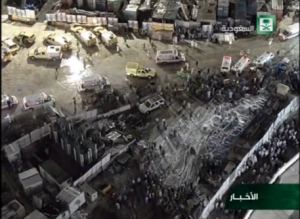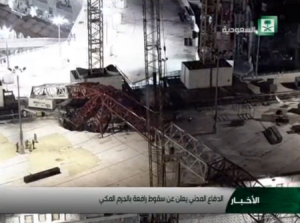
(Reuters) — The death toll in a crane accident at the Grand Mosque in the Muslim holy city of Mecca rose to 87 on Friday (September 11), the head of Saudi Arabia’s civil defence authority told Al Ikhbariya television. He said 183 people had been injured.
The accident came just weeks before Islam’s annual haj pilgrimage.
Al Arabiya television earlier said the crane had fallen because of strong storms – western Saudi Arabia has been hit by strong sand storms in the last few days.

Saudi authorities go to great lengths to prepare for the millions of Muslim who converge on Mecca to perform the sacred pilgrimage. Last year, it reduced the numbers permitted to perform haj for safety reasons because of construction work to enlarge the Grand Mosque.
The pilgrimage, one of the largest religious gatherings in the world, has been prone to disasters in the past, mainly from stampedes as pilgrims rushed to complete rituals and return home. Hundreds of pilgrims died in such a stampede in 2006.
Saudi authorities have since lavished vast sums to expand the main haj sites and improve Mecca’s transportation system, in an effort to prevent more disasters.
Security services often ring Islam’s sacred city with checkpoints and other measures to prevent people arriving for the pilgrimage without authorization.
Those procedures, aimed at reducing crowd pressure which can lead to stampedes, fires and other hazards, have been intensified in recent years as security threats grow throughout the Middle East.







